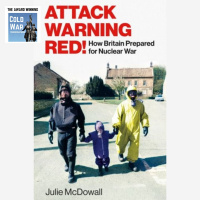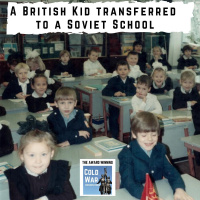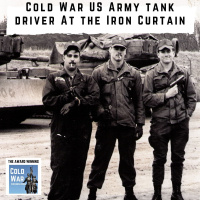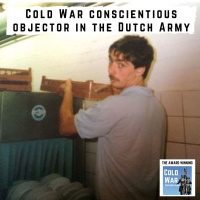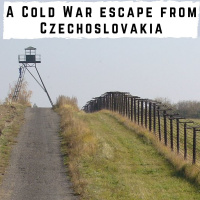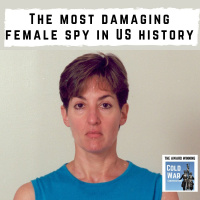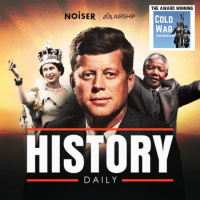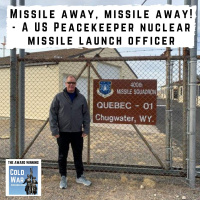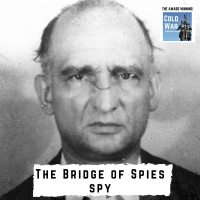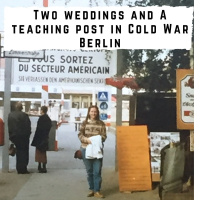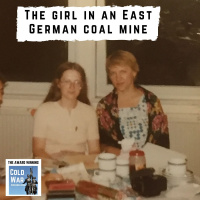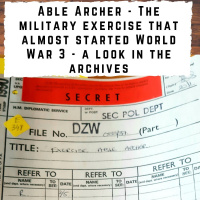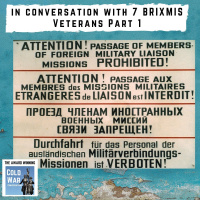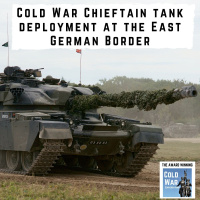Cold War Conversations
- Author: Vários
- Narrator: Vários
- Publisher: Podcast
- Duration: 353:13:22
- More information
Informações:
Synopsis
In conversation with those that experienced the Cold War and those who are fascinated.
Episodes
-
How Cold War Britain prepared for Nuclear War (285)
07/04/2023 Duration: 01h17minDuring the Cold War, the awesome power of nuclear weapons and its deadly fallout meant that every town, village and home in Britain fell under the nuclear shadow, and the threat of annihilation coloured every aspect of ordinary life. I chat with author and fellow Cold War podcaster Julie McDowall about her new book Attack Warning Red!: How Britain Prepared for Nuclear War. We discuss how families were encouraged to construct makeshift shelters with cardboard, plastic sheets and sandbags, as well as how vicars and pub landlords learnt how to sound hand-wound sirens, offering four minutes to scramble to safety. and the thousands who volunteered to give nuclear first aid, often consisting of breakfast tea, herbal remedies, and advice on how to die without contaminating others. It's a fascinating, haunting and darkly humorous look at the UK government’s attempts to prepare the UK population for nuclear war while bunkers were readied for the officials and experts who, in theory, would ensure life continued aft
-
Beyond the Wall: East Germany, 1949-1990 (284)
31/03/2023 Duration: 01h26minIn 1990, a country disappeared. When the Iron Curtain fell, East Germany simply ceased to be. For over forty years, from the ruin of the Second World War to the cusp of a new millennium, the GDR presented a radically different German identity to anything that had come before, and anything that exists today. Socialist solidarity, secret police, central planning, barbed wire: this was a Germany forged on the fault lines of ideology and geopolitics. I talk with acclaimed historian Katja Hoyer Whose new book Beyond the Wall: East Germany, 1949-1990 offers a kaleidoscopic new vision of this vanished country. Beginning with the bitter experience of German Marxists exiled by Hitler, to the creaking foundations of socialism in the mid-1980s, we discuss that amid oppression and frequent hardship, East Germany was yet home to a rich political, social, and cultural landscape, a place far more dynamic than the Cold War caricature often painted in the West. Powerfully told, and drawing on a vast array of never-before-se
-
A British kid transferred to a Soviet school (283)
25/03/2023 Duration: 51minRichard was 6 years old when he was uprooted from a school in the United States to a Soviet school 700 miles East of Moscow. In 1988 the Soviet Union was opening up following Michael Gorbachev’s policy of Perestroika and American firms began looking at the possibility of trading with the Soviet Union. It was politically and economically sensitive and his family was chosen to be sent to the USSR to open a factory in the industrial town of Nizhnekamsk in Tartarstan. They lived in a special apartment building designated for foreigners and Richard attended the local school. Being thrown in the deep end of a Soviet school was a shock to him and he had to adapt fast, not least by learning Russian. He describes his school experiences and the stark contrasts with his previous life. Despite the difference, he found being six years old in the Soviet Union in all, rather fun. There was a Lunar Park for us to go on rides, war-themed toys like tanks and soldiers even at school, and all sorts of mischief were had. L
-
Cold War US Army tank driver at the Iron Curtain (282)
18/03/2023 Duration: 01h39minBrian Regal entered the US Army in 1977 and served on the M60A1 tank initially as a driver. The M60A1 was America's primary main battle tank during the Cold War, with initial deployment in 1960 and combat service through to 1991. After tank school, Brian was sent to West Germany where he was assigned to the 3/35 Armor in the Bamberg Garrison as part of the 1st Armored Division US Army, where the 3/35 was tasked to fight a Warsaw Pact attack across the Czechoslovak and East German borders. Brian was also his company’s nuclear, biological and chemical warfare specialist. He describes in detail his training, how patrols were conducted along the borders, an incident with a Soviet Military Liaison mission car, the war games amongst the West German civilians, as well as practice alerts. It’s a great chat and Brian is frank about his role and the scant expectations for survival if war did come. He is now Dr. Brian Regal, Professor for the History of Science, Technology, and Medicine at Kean University, New Jers
-
Cold War Dutch conscientious objector (281)
11/03/2023 Duration: 01h01minIn 1987 Martin received a letter informing him of his conscription into the Dutch Army. A number of European NATO countries had conscription during the Cold War. Holland’s applied to men over the age of 18 and included service for about a year, after which you were placed on the reserve. Martin objected to military service as a conscientious objector on religious grounds. Conscientious objectors could perform alternative civilian service instead of military service. However to get to be an official “conscientious objector” you had to pass multiple military courts and military procedures which was especially challenging for someone aged 17 years old. Martin is very honest about his beliefs and his experiences. During the Cold War he was seen by some as an enemy because he refused to bear arms to protect his country. You may disagree with his views, but it’s a Cold War topic that is little covered elsewhere and I’m sure you will find my conversation with Martin as fascinating and powerful as I did. 0:00 I
-
Discovering your Cold War Czechoslovak Secret Police file (280)
04/03/2023 Duration: 53minMark Baker was featured in episode 9 where he told us about working in Czechoslovakia in the 1980s as a journalist for a small publishing company called Business International (BI). He was the company’s Czechoslovakia expert and with his Czech minder Arnold he travelled to Prague and other cities to report on significant economic and political developments. In 2021, he published “Čas Proměn” (“Time of Changes”), written in Czech, it is a collection of stories about Central and Eastern Europe in the 1980s and early ‘90s. Over the Christmas 2021 holidays, as he was visiting family in Ohio, he received a surprise email from a Czech academic. He was writing to Mark that he had finished reading the book and that he liked it. But then he added, cryptically, that Mark might want to revise part of it for future editions as he had found Mark’s Czechoslovak secret police surveillance file… We hear about the plans the Czechoslovak secret police had for Mark and the secret of Operation Oheň, aka Operation Fire. 0:00
-
A Cold War escape from Czechoslovakia (279)
25/02/2023 Duration: 49minWe return to Dirk’s story from episode 278 with a move to East Berlin following his mother’s divorce from his father. Dirk finds school life more relaxed where pupils are allowed to wear Western clothing and to speak more openly, even questioning their teachers about the existence of the Berlin Wall. After leaving school, Dirk starts work in a factory from which he can see into West Berlin and he longs for a life away from the restrictions of East Germany. His mother’s new partner is a conscripted border guard who advises him not to attempt an escape over the Wall. However, as East Germany starts to implode in November 1989 Dirks sees a chance to escape… We also hear of his and his family’s life in the new Germany where at school reunions the children of Stasi families reveal their secrets and his mother sees the contents of her Stasi file. 0:00 Introduction and Dirk's life in East Berlin 7:24 Dirk's career and encounters with international leaders 15:33 Dirk's changing perspectives on East Germany and
-
Growing up in the Stasi town (278)
18/02/2023 Duration: 51minDirk lived in the town of Bernau about 15 miles from East Berlin. Just outside Bernau was Wandlitz the residential estate of the East German leadership. As a result, Bernau had one of the highest densities of Stasi facilities in East Germany. Dirk shares details of his childhood growing up in a Plattenbau block of flats where his school friends were children of NVA officers, Stasi officers, and Soviet Army officers. He shares some fascinating details of school life and visits the homes of his school friends in Bernau. However, his parents clashed with his school teachers as they bullied Dirk for wearing western clothing. We also hear how his parent's anti-soviet view originated with his grandparents fleeing the World War 2 Soviet invasion of East Prussia and an Uncle who was arrested and disappeared in Berlin in 1945. 0:00 Introduction and Dirk's early life in East Germany 8:45 Impact of the Berlin Wall on Dirk's family and visits from West German relatives 16:22 Confrontations with teachers over Western
-
The most damaging female spy in US history (277)
11/02/2023 Duration: 01h23minAna Montes was the most damaging female spy in US history. For nearly 17 years, Montes was one of the government's top Cuba experts, with easy access to classified documents. By night, she was working for Fidel Castro's Cuba, listening to coded messages over shortwave radio, passing US secrets to handlers in local restaurants, and slipping into Havana wearing a wig. Her only sister, Lucy, worked for the FBI helping the FBI flush Cuban spies out of the United States. Little did Lucy or her family know that the greatest Cuban spy of all was sitting right next to them at Thanksgivings, baptisms, and weddings. I speak with investigative journalist Jim Popkin whose book Code Name Blue Wren, weaves the tale of two sisters who chose two very different paths and reveals the making of a traitor- a woman labelled "one of the most damaging spies in U.S. history" by America's top counter-intelligence official. After more than two decades in federal prison, Montes was freed in January 2023. 0:00 Introduction to Anna
-
The 1989 US Invasion of Panama & the 1989 Tiananmen Square massacre (276)
08/02/2023 Duration: 37minEvery weekday on the History Daily podcast, Lindsay Graham takes you back in time to explore a momentous moment that happened ‘on this day’ in history. 1989 was a pivotal year for the Cold War. The fall of the Berlin Wall, free elections in Poland, and the almost bloodless revolutions in the other Warsaw Pact countries apart from Romania. However, two other important events occurred in 1989 and this bonus episode will cover those events. So here is the 1989 US Invasion of Panama and the 1989 Tiananmen Square massacre courtesy of our friends at History Daily. Just search History Daily in your podcast app for further episodes. https://www.historydaily.com/ We have two full episodes for you. 1989 US Invasion of Panama December 20, 1989. President George H.W. Bush launches a US invasion of Panama to depose the country's dictator, and former CIA informant, Manuel Noriega. The Tiananmen Square Massacre June 3, 1989. In a bloody government crackdown on dissent, Chinese troops storm Beijing's Tiananme
-
Missile away, missile away! - A Cold War US Peacekeeper nuclear missile launch officer (275)
04/02/2023 Duration: 01h24minTim Lyon was an officer assigned to the 400th Strategic Missile Squadron located in Cheyenne Wyoming. The Squadron was maintained 50 Peacekeeper ICBM missiles based in underground silos in farmers’ fields in remote areas of Wyoming. Tim was one of two launch officers who were responsible for 10 of these missiles. He and his colleague would descend forty to sixty feet below ground to a concrete capsule that housed the Launch Control Centre. There he would spend 24-hour alerts ready to launch 100 nuclear warheads — each with twenty times the explosive force of the Hiroshima bomb at speeds of 15,000 mph. We hear in detail about his training, the testing procedures, security, and how he handled such a huge responsibility. Tim also describes launching one of these missiles from a test site in the US. Episodes mentioned: Commanding a Royal Navy Polaris Nuclear Missile Submarine https://coldwarconversations.com/episode168/ Cold War history is disappearing; however, a simple monthly donation will keep this podc
-
Red Elvis on tour, aka Dean Reed the US Cold War music star (274)
28/01/2023 Duration: 59minWarning: This episode does cover the subject of suicide. If you need help please use these links: UK https://www.samaritans.org/how-we-can-help/contact-samaritan/ Rest of the World https://findahelpline.com/i/iasp Dean Reed was an American actor, singer and songwriter, director, and Socialist who became a huge star in Latin America and the Eastern Bloc. Neil Jacobs is a guitarist who first met Dean Reed briefly while renting accommodation from Will Roberts, who directed the documentary of Dean Reed called “American Rebel”. Neil served on the US Cultural Delegation to the Moscow World Youth Festival in 1985 and unlike most of the participants, he was assigned by the Soviets. I did not go through any of the screening processes that the American Delegation had undergone, and therefore has a unique perspective on the event. It was at this event he began his friendship with Dean Reed. Additionally, he traveled with Dean Reed extensively both in the US and in the Eastern Bloc from 1985 -1986 and was one of
-
The Bridge of Spies spy (273)
21/01/2023 Duration: 01h23minOn 10 February 1962, Gary Powers, the American pilot whose U2 spy plane was shot down in Soviet airspace, was released on “The Bridge in Spies” in Berlin by his captors in exchange for one Colonel Rudolf Abel, aka Vilyam Fisher - one of the most extraordinary characters in the history of the Cold War. Born plain William Fisher in Newcastle upon Tyne, in the UK this British grammar schoolboy was the child of revolutionary parents who had fled tsarist oppression in Russia. Their son returned to his spiritual homeland, the newly formed Soviet Union, and became a spy, embarking on a mission to New York, where he ran the network that stole America's atomic secrets. In 1957, Willie's luck ran out and he was arrested and sentenced to thirty years in prison. Five years later, the USSR's regard for his talents was proven when they insisted on swapping him for Gary Powers. I speak with Vin Arthey, the author of “Abel. The true story of the spy they traded for Gary Powers” Vin Arthey has traced Willie's tale from
-
Two weddings and a teaching post in Cold War Berlin (272)
14/01/2023 Duration: 52minMarie-Claude Hawkes continues her story with her return to Berlin in 1985 as a French teaching assistant at the Havel School RAF Gatow, teaching French and taking part in school activities in West and East Berlin. Between September 86 and August 87 Marie-Claude was employed as a cartoonist for the Berlin Bulletin, the weekly magazine for the British Forces in Berlin. Marie Claude describes her experiences as a French citizen working for the British Army as well as the challenges of being a French civilian in Berlin marrying a British citizen. In February 1988 Marie-Claude started work as the Director of Extra-Mural Studies at 46 AEC (Army Education Corps), Smuts Barracks in Spandau. While organising various classes for service men/women and their ‘dependents’, she also provided interpreting and trips to East Berlin for various purposes, one illegal… It’s a fascinating view of Cold War Berlin from a perspective not heard before. 7:14 Marie-Claude Hawkes' experiences in Berlin and role at the Harvard School
-
The girl in a Cold War East German coal mine (271)
07/01/2023 Duration: 49minIn 1981 Marie-Claude Hawkes was an 18-year-old living in Amiens, France when she embarked on a trip to East Germany looking for adventure… Among her experiences was working in a lignite coal mine. Lignite is considered the lowest rank of coal and the most harmful coal to human health but was a major fuel source for East German power stations. Marie-Claude travelled from Paris to Leipzig on an overnight train, staying at the International Youth Camp in Borna. From there she travelled every day to work in the open lignite mine at Espenhain, about 16 miles from Leipzig. She describes working at the mine, weekends off, visits to Leipzig, Magdeburg, Weimar, and a potato peeling factory...! It’s a fascinating view of East Germany away from the capital Berlin. 0:00 Introduction and Mary Claude Hawkes' initial experiences in East Germany 2:06 Sponsor: Promotion of Cold War Conversations and listener's testimonial 4:51 Mary Claude Hawkes' journey to East Germany and arrival at the International Youth Camp 13:43 Wo
-
In conversation with 7 BRIXMIS veterans - Part 2 (270)
04/01/2023 Duration: 01h06minPart 2, of a two part recording. Part 1 is here https://coldwarconversations.com/episode268 In October of 2022, I was asked by the West Pennines Military Vehicle Trust to moderate a Q&A session with a number of BRIXMIS veterans. Attending were Drivers Neil Walton, Pete Curran, Dave Collins and Kev Smith, plus Sandy Saxton-Warne (Joint operations & weapons) , Mike Hill (Tour officer), Mike Corcoran (Weapons), and Dave Butler (Senior Non Commissioned Officer, Tourer). It was an amazing afternoon of reminiscing about their experiences and viewing the amazing collections they had from that time. My good friend Colin Dyter was a massive help with the recording, but a quick note that the audio is not up to the usual quality of Cold War Conversations, due to background noise, but I think the events and activities described definitely make it worth listening to. 0:00 Introduction and background on the episode's guests 2:15 BRIXMIS veterans and their stories 6:44 Importance of safeguarding sensitive equipment and
-
Able Archer - The military exercise that almost started World War 3 - a look in the archives (269)
31/12/2022 Duration: 51minIn 1986 Soviet Leader Mikhail Gorbachev said “Never perhaps, in the post-war decades has the situation in the world been explosive and hence more difficult and unfavourable as in the first half of the 1980s. “ He was referring to a period of immense tension between the Soviet Union and NATO when in 1983 a NATO exercise called Able Archer was believed to have almost accidentally started World War 3. We delve into the Able Archer archives to talk about the most recent documents with Francesca Akhtar, a researcher whose main research interests are US Cold War foreign policy, intelligence history and defence. Francesca has written a dissertation entitled “The most dangerous Soviet-American confrontation since the Cuban Missile Crisis?” An analysis of the origins, nature, and impact of the Able Archer 83 incident. 0:00 Introduction and context about Able Archer 1:07 Overview of Able Archer and its potential to start World War 3 2:15 Sponsor message and call for donations 3:19 The changes in Able Archer in 1983
-
In conversation with 7 BRIXMIS veterans - Part 1 (268)
28/12/2022 Duration: 01h06minIn October of 2022, I was asked by the West Pennines Military Vehicle Trust to moderate a Q&A session with a number of BRIXMIS veterans. Part 2 is here https://coldwarconversations.com/episode270 Attending were Drivers Neil Walton, Pete Curran, Dave Collins and Kev Smith, plus Sandy Saxton-Warne (Joint operations & weapons) , Mike Hill (Tour officer), Mike Corcoran (Weapons), and Dave Butler (Senior Non Commissioned Officer, Tourer). It was an amazing afternoon of reminiscing about their experiences and viewing the amazing collections they had from that time. Don’t miss part 2 which follows next week. My good friend Colin Dyter was a massive help with the recording, but a quick note that the audio is not up to the usual quality of Cold War Conversations, due to background noise, but I think the events and activities described definitely make it worth listening to. 0:00 Introduction and story from Dave Collins 5:25 Dave Collins recounts the night the wall came down 8:47 Neil Walton talks about their commun
-
Home Bases: Memories & Stories of US Military Bases in the UK (267)
24/12/2022 Duration: 01h11minSean Kelly is the author of Home Bases: Memories & Stories of US Military Bases Around London which for the first time, puts the spotlight on the history of many of the US Military’s lesser-known command and support bases that were located either in or close to London. The bases (often known as ‘Little Americas’) are furthermore brought to life in a series of ‘snapshot’ memories. We hear about the heroism of US personnel who were awarded the George Medal for bravery in rescuing people caught in the great floods of 1953 as well as including actor Larry Hagman who played JR Ewing in the TV series Dallas. We talk about the memories of bases further afield such as Upper Heyford, Greenham Common, Sculthorpe, and Burtonwood. 0:00 Introduction and background of Sean Kelly 1:59 Sponsor: Call for donations 2:23 Guest Introduction: Sean Kelly 7:38 Sean Kelly's book "Home Bases" and the history of US military bases in London 15:20 Personal stories from US military bases 28:31 Transformation and current state of Gre
-
Cold War Chieftain tank deployment at the East German Border (266)
17/12/2022 Duration: 59minWe’re back with Alan Hodges, a Royal Tank Regiment Chieftain tank commander, and Mick Hadfield who was his 17-year-old gunner. In this episode we talk in detail about their deployment within a kilometer of the East German border and their tasks should H Hour have come as well as emergency deployment from barracks. There is no affection for their main training area at Soltau described as “the moon with a few trees and also in less polite terms. However, these training periods are made better by the regular appearance of Wolfgang, a German entrepreneur and British Army legend who was uncannily able to place his snack vans whenever the British Army deployed. We also hear how the crew was also trained on how to evacuate the tank if it was hit as well as how to evade capture and resist interrogation. It’s anecdotes galore again including a visit from a Swedish Major who unwisely was given the chance to drive Chieftain. There’s also sadness as we remember those that never came back from exercises due to acc

